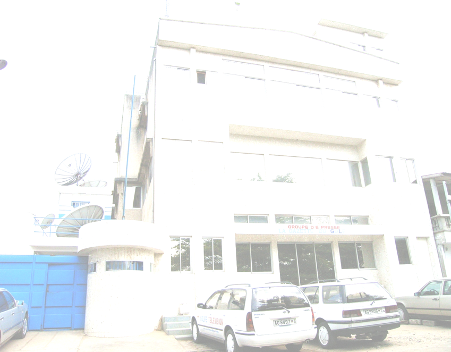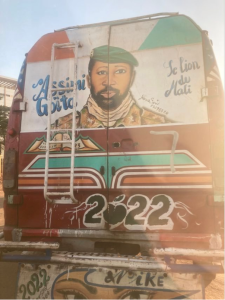This year the European Conference on African Studies took place in Cologne. For four days, scholars attended the conference to discuss the pertinent theme African Futures. In light of this theme, DDMAC contributed with a panel on emerging socio-political leadership in times of conflict and digitalization.
Due to the unfortunate allocation of visa, six instead of nine scholars attended to present a paper. The scholars took turns to present empirical work on Media forerunners, young actors whom as creators of public opinion on social media precede what and who comes next. Mirjam de Bruijn moderated the panel.
Tanaka Masataka presented on grogneurs, participants of interactive radio shows, in Bénin. Going back to the early morning shows of the late 90s, he provided an interesting overview of the changing communicative practices of grogneurs and their recent engagement on media platforms like Facebook.

Golfe FM, Cotonou, Bénin
Walter Nkwi discussed the role of virtual presidents in the Anglophone crisis in Cameroon. He referred to both the diaspora and Cameroonians from ghost towns as important media actors in the discussion of Anglophone conflict issues.
Samba Dialimpa took Malian blogger associations as an example of the civic engagement in times of conflict. He discussed the formation of these associations and the role of networks of bloggers in the distribution of information in the context of growing authoritarianism and disinformation.
Luca Bruls moved the discussion to TikTok in Mali, where influencers, microcelebrities, and previously unknown users make conflict go viral. She elaborated on the state supportive narratives that dominate TikTok and what lessons scholars have to draw from the interrelationship between technology, power, and politics.
Modibo Galy Cissé presented on porte-paroles of WhatsApp in Mali. These spokesmen share information on recent conflict events through audio messages in regional or ethnically affiliated WhatsApp groups. Modibo made clear that WhatsApp provides a space for counternarratives that seem to be absent on other social media platforms.

Credit photo: Eva Magdalena Stambøl
Almamy Sylla presented a paper, written in collaboration with Signe Cold-Ravnkilde, on Malian pro-junta youth organizations. He focused on videomen, young people who host online video channels for the communication by political leaders. These creators engage in an anti-imperial, nationalist, and pro-Russia discourse and therewith legitimize specific political leaders of tomorrow.
The hybrid characteristics of these different actors across West-Africa sheds light on the growing importance of media platforms in the makings of ideology and new information cycles. While there is a lot of overlap between the cases in Mali, Bénin, and Cameroon, the case studies also show that public opinion takes different forms depending on the platform. Public opinion is multidimensional and interactive and hence depends on the input of several people and their respective forerunners.
The panel leaves room for more discussion and reflection on the role of cyber protagonists in West Africa. Therefore, we aim to collect these papers in an edited volume. Keep an eye out on the DDMAC website for updates!


